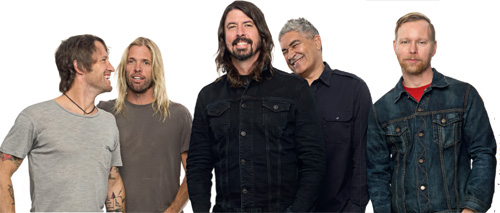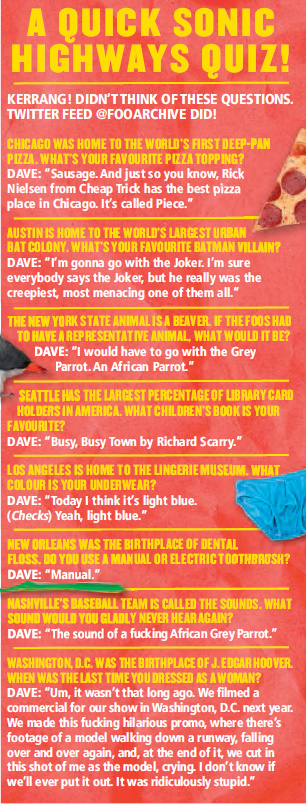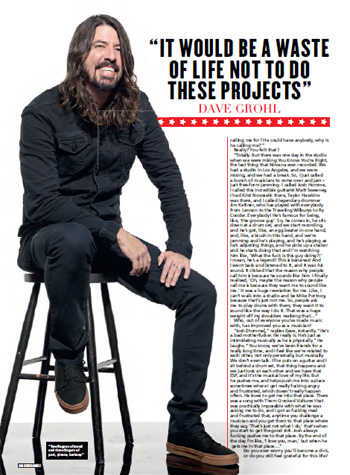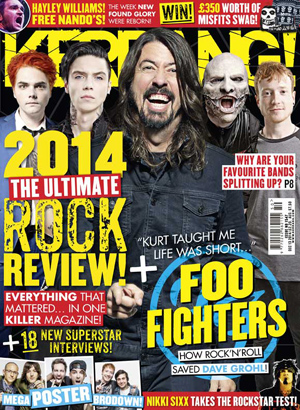No band opened doors like Nirvana. Whether it was Kurt wearing the T-shirts of strictly underground concerns such as Daniel Johnston or Flipper on mainstream TV, or bringing Shonen Knife and Captain America into the mega-domes that hosted his superstar headline act, or recording covers of The Vaselines and the Meat Puppets that, in turn, worked unprecedented wonders by turning others onto those acts’ underappreciated back catalogues, when Nirvana broke into the mainstream they were handing escape pods to their underground friends in a way no band had before, or has done since. Why? Well, you can be invited to the swankiest party in town, but if there’s nobody there you actually like, then what’s the point? You might see Dave as continuing that tradition.
“In a way, Sonic Highways is the same thing,” says Dave of the Foo Fighters’ present project – eight songs, recorded in eight American cities, with an HBO-made documentary to accompany each one. The entire project is pitched as a love letter to the history of American rock.
“I look at American music like a community of musicians,” Dave explains. “If it weren’t for Buddy Guy, if it weren’t for Cheap Trick, if it weren’t for Ian MacKaye, we wouldn’t be where we are musically [today], you know? It’s not like you need to know the history to enjoy music, but the substance and depth of musical roots makes everything a little richer and fuller.” Dave takes a sip of coffee, pushes his reading glasses across the table. “So I guess it does relate to Nirvana. It’s something that we were raised on in that underground community, like, you know, ‘Make sure that if you get a little piece of the pie, that you share it…’” Sonic Highways is music TV like you always dreamed about. How did it come about?
“It’s a shame music TV doesn’t exist like it once did. In America, it’s been reduced to one song at the very end of a talk show at 12:30 at night, or just like a music contest. When I first brought Sonic Highways to different networks, I think they were kinda puzzled, because this didn’t fit into the current format of music on television, but I wanted to try and change that. To give these people and their music and their stories a platform that had more substance and depth. I enjoyed doing it – you sit down and you interview people and you just kind of sit and have a conversation with people. My father was a writer – he was a journalist – and my mother was a creative writing teacher. Now I’m a high school dropout, but somewhere in my DNA zipper, there are elements of storytelling and writing and music, and it was almost inevitable that, at some point, I would tell these stories outside of the back lounge of a tour bus, or belly-up to a bar…”

For everything that Dave Grohl has achieved in the 20 years since he tentatively stepped out from behind the typical end-of-gig wreckage of Nirvana’s backline – the arena-rock concerts, the guest collaborations, the personal projects that you might prefix with ‘vanity’ if this was a man who, even at 45, didn’t still look like any fuzzy-faced dude you might find hanging out around the stage doors at the end of any rock concert – Dave’s biggest contribution is still his first, when his sprightly but aching Foos veered into view in 1995, among a junkyard of misery and curtailed promise. A shard of noise when all went silent. A reminder of life when once there was just death. And so it’s coincidental, but fitting, that in a year when rock remembered what was taken from it, let alone what Dave had taken from him, he’s pulled it off again. Via America’s Sonic Highways, Dave Grohl is on a mission to ensure the music he loves – rock’n’roll in layman’s terms – will never, ever die. That there will never be silence again. You might call it his life’s work.
“Look!” booms Dave. “Pat Smear in
corpse paint!”
Dave is showing Kerrang! his
iPhone wallpaper. It is, as he says, a picture of
Foo Fighters guitarist/punk legend Pat Smear,
in corpse paint, tucked into bed. We won’t ask.
What we will ask is if the Nicest Guy In Rock
ever meets someone during the course of his
musical adventures and… well… just thinks
they’re a fucking dick?
“Are you kidding me, dude?” says Dave.
“The world’s full of dicks. There are plenty of
musicians that are just fucking miserable and
don’t appreciate what they have. Those are
usually the dicks. That said, the ones that are
really psyched about music and really fucking
appreciate that they get to do it for fun or for
a living or whatever, those are my favourite
kinds of people…”
From being a mere slip of the man he is
today and first picking up a guitar, Dave
always knew he wanted to make music – and,
as a consequence, hang out with musicians.
The life that has followed has been the
pursuit of that ambition. Moreover, Sonic
Highways – and, in a sense, Sound City,
the 2013 ode-to-a-mixing-desk doc that
led Dave to this place of TV documentaries
and storytelling – can perhaps be seen as
celebration of that ambition.
“Once people realise that you’re open to
collaborating and experimenting outside of
what you’re most recognised for,” says Dave,
“then music becomes a flood of opportunity.
So, Killing Joke call to ask me to play drums
on their [2003 self-titled] record. What do you
think I’m gonna say? That was my first punk
rock T-shirt when I was 13! So then it becomes
like a bucket list. ‘Rad, I got to jam with Paul
McCartney. Cool, we just recorded with the
dudes from Queen. There’s Joe Walsh from
The Eagles. I get to be in Queens Of The Stone
Age. Now I’m on a Nine Inch Nails record!’
And you collect all of these experiences
and they make their way into what you do.
Some musicians join a band, and they stay
in that band for 20 years, and they don’t
do anything other than being in that band.
I get it, but god, what a drag! When I was
young, I was friends with everybody. I was the
only punk rock kid within 20 miles in my little
neighbourhood in Virginia, but I hung out with
the stoners, and the geeks, and the nerds, and
the jocks, just because I could pretty much get
along with anybody, musically as well…”
Dave laughs.
“It’s funny, and I’m not just saying this
because I’m talking to Kerrang!, but [Pantera
guitarist] Dimebag Darrell was the king of
that. He could be anybody’s best friend. He
was the sweetest guy in the world, and if you
could sit down and do a shot with him, you
were his best pal. You could be fucking Justin
Bieber or King Diamond – it didn’t matter,
he just loved to hang out with people, and I
was the same when I was a kid. It just sort
of translates into what I do musically, like,
‘You know what, you want me to come
play drums with you? Let’s get together
and jam, see what happens.’”
You say that, Dave, but 20 years ago,
when everything with Nirvana went to
shit, Kerrang! reported that you were
set to become Tom Petty’s drummer. You
started a band instead. Were you worried
the musical freedom you enjoy now was
going to be denied to you if you became
‘drummer for hire’?
 Dave sighs. “I was afraid that would
happen. It was such a difficult time after
Kurt died, and I didn’t play music or listen
to music for a while. Music was all I did
from the time I was 13 years old until 1994,
and it just stopped. People started asking
me to come and play drums with them,
but I was scared that just sitting behind a
drum set would not only keep me in that
place musically, but keep me in that place
emotionally, for the rest of my life. So I just
decided I would try something new…”
Dave sighs. “I was afraid that would
happen. It was such a difficult time after
Kurt died, and I didn’t play music or listen
to music for a while. Music was all I did
from the time I was 13 years old until 1994,
and it just stopped. People started asking
me to come and play drums with them,
but I was scared that just sitting behind a
drum set would not only keep me in that
place musically, but keep me in that place
emotionally, for the rest of my life. So I just
decided I would try something new…”
And that was the Foo Fighters?
“Yeah. But remember, that first Foo
Fighters record wasn’t supposed to be a
record or a band – it was just this experiment
I did in the studio down the street from my
house. Even before I was in Nirvana, I’d record
with my friend, Barrett Jones, in his 8-track
studio, and do songs by myself where I’d
record the drums fi rst, and then I’d overdub
guitars, and then I’d overdub the bass, and
then I’d put a vocal on it, and then listen back
and it kind of sounded like a group. I did that
shit on my own in my basement for years…”
In 1992, you actually released a solo album
of sorts, Pocketwatch, on the Arlington,
Virginia, label Simple Machines – there’s an
early version of Winnebago on it…
“I called that band LATE! because I thought it
would be funny if you walked up onstage and
just said, ‘Hi, everybody, we’re LATE!.’ Stupid!
But that was just sort of like this basement
experiment, and then I thought, ‘Okay, well, I
have to get up and do something.’ This is after
Nirvana had ended and I thought, ‘I have to…
I gotta do something. I can’t not play music,
so I’m just gonna go get this out of my system
at the studio down the street from the house,
and it just all started from there. But there
was never really any foresight or thinking like,
‘Okay, this is gonna last 20 fucking years.’ It
was just kinda for fun.”
With all this musical meandering you do, do
the Foos keep you grounded? Is it something
to come home to?
“It’s definitely my anchor and my family,”
nods Dave. “It actually gives me the freedom
to go out and do those other projects, just as
everybody else goes out and does their own
projects. It’s encouraged in the Foo Fighters.
That way, when we come back to the band,
we appreciate what we’ve got, because we’ve
got a good thing going. But I honestly think
that sometimes what happens is, you join
a band and that becomes your identity,
when a lot of people have so much
more to offer than just what they do
with that combination of people in that
band. Like, it took me a long time to
understand why anyone wanted me to
play drums with them. When Tom Petty
called, I thought, ‘What the fuck is he
calling me for? He could have anybody, why is
he calling me?’”
Really? You felt that?
“Totally. But there was one day in the studio
when we were mixing You Know You’re Right,
the last thing that Nirvana ever recorded. We
had a studio in Los Angeles, and we were
mixing, and we had a break. So, I just called
a bunch of musicians to come over and jam –
just free-form jamming. I called Josh Homme,
I called this incredible guitarist Matt Sweeney,
I had Krist Novoselic there, Taylor Hawkins
was there, and I called legendary drummer
Jim Keltner, who has played with everybody
from Lennon to the Traveling Wilburys to Ry
Cooder. Everybody! He’s famous for being,
like, ‘the groove guy’. So, he comes in, he sits
down at a drum set, and we start recording,
and he’s got, like, an egg beater in one hand,
and, like, a brush in this hand, and we’re
jamming and he’s playing, and he’s playing as
he’s adjusting things, and he picks up a shaker
and he starts doing that and I’m watching
him like, ‘What the fuck is this guy doing?!’
I mean, he’s a legend! This is bananas! And
I went back and listened to it, and it was his
sound. It clicked that the reason why people
call him is because he sounds like him. I finally
realised, ‘Oh, maybe the reason why people
call me is because they want me to sound like
me.’ It was a huge revelation for me. Like, I
can’t walk into a studio and be Mike Portnoy,
because that’s just not me. So, people ask
me to play drums with them; they want it to
sound like the way I do it. That was a huge
weight off my shoulders realising that…”
Who, out of everyone you’ve made music
with, has improved you as a musician?
“Josh [Homme],” replies Dave, instantly. “He’s
a bad motherfucker. He really is. He’s just as
intimidating musically as he is physically.” He
laughs. “You know, we’ve been friends for a
really long time, and I feel like we’re related to
each other, not only personally, but musically.
We don’t even talk. If he puts on a guitar and I
sit behind a drum set, that thing happens and
we just look at each other and we have that
ESP, and it’s the musical love of my life. But
he pushes me, and helps push me into a place
sometimes where I get really fucking angry
and frustrated, which doesn’t really happen
often. He loves to get me into that place. There
was a song with Them Crooked Vultures that
was practically impossible with what he was
asking me to do, and I got so fucking mad
and frustrated that, anytime you challenge a
musician and you get them to that place where
they say, ‘That’s just not what I do,’ that’s when
you start to get the good shit. Josh always
fucking pushes me to that place. By the end of
the day I’m like, ‘I love you, man,’ but when he
gets me in that place…”
Do you ever worry you’ll become a dick,
or do you still feel grateful for this life?
“Are you fucking kidding me? Can you
imagine? I’m a high school dropout that
worked in a fucking furniture warehouse, and
now I get to fly all over the world and talk
about music with people. Fuck yes! Absofuckinglutely!
Shit yeah! Hell yeah! Especially
when you’re standing at the lip of the stage
in Wembley Stadium, and you’ve got 80,000
people singing your song, and you think
about that little demo tape that you made
just to get off the couch. I never fucking lose
sight of that, ever. Music is everything to me.
I did it for a long time before anyone listened,
[and] I’m sure I’ll be doing it for a long time
after people stop. I go home and I jam with
my kids. I’ll turn on the fucking computer and
record us doing some free-form, like, freakout,
improv shit…”
What happens if your kid turns to you as a
teenager, like you did to your mum, and says,
“I’m leaving to fly hundreds of
miles away to make music with a
hardcore band…”?
Dave pauses. “I’ll cross that bridge
when I get to it. I can’t believe that
my mother let me do those things.
I mean, my mother disciplined me
with freedom. I grew up with my
mother, and she and I were, like,
best-friends close. We would go to
jazz clubs together, and we would
listen to records together – but
she was still my mother, so I never
wanted to disappoint her because
she was my friend. She was fucking
cool. So she would give me freedom
so that I could appreciate it enough
that I wouldn’t do anything stupid
to fuck it up. My kids are eight, five,
and three months, so I’m not really
worried about any of that yet…”
Do your kids play music?
“Well, Violet [Dave’s eldest of
three daughters], she was learning
the flute in school. My father
played the flute, so I think that’s why she
wanted to do it, but it’s fucking hard! Your
mouth has to do this… thing! So, my wife says,
‘I got an email from Violet’s music teacher;
it says that she’s not even putting her flute
together in class.’ She’s like, ‘Dave, you need to
talk to her.’ So I sit down with Violet, and I say,
‘Hey Boo, we got an email from your teacher.’
She goes, ‘I know…’ I said, ‘What’s going on?’
and she goes, ‘I just can’t, I’m embarrassed,
I can’t do it, and I get up there and I can’t
make the noise come out of the flute, and
it’s embarrassing…’”
So what did you say?

“Fuck that.”
“In the last four days, I’ve probably
initiated the next year of my life
in silly projects that eventually
everyone will see,” laughs Dave. “The fact
that I had the opportunity and the resource
to do something like Sonic Highways, or
to do something like Sound City, or to do
any of the other ideas I have, it would be
a waste of a life to
not do them. That’s
something that I had
a new appreciation of
after Nirvana ended,
after Kurt died. Life
is short, and fragile,
and you gotta make
do with it while you
can.” He takes another
slug of coffee. “I
honestly look at all
these opportunities
like they’re wasted
moments unless you
capture them…”
Next year the Foo Fighters turn 20. This year
is 20 years since Kurt passed. The first time
the surviving members of Nirvana reunited
onstage to play Nirvana songs in 20 years.
So many anniversaries. So much music to be
made. Moments to be captured.
“At the Rock And Roll Hall Of Fame thing,
when Krist and Pat and I had gotten into a
room and played those songs for the first time
in 20 years, it sounded like it did 20 years ago.
After all that time, you sort of forget about the
reasons why people liked Nirvana in the first
place, because it had become this other thing.
It’s no longer three dudes in a van playing at
Dingwalls or whatever – it’s like a legend or
some iconic idea. But it really was just three
people playing in a room.”
Dave grins a smile that has to, in some way,
hurt his face.
“So then you put Pat and Krist and I in a
room again, and we play Scentless Apprentice.
And the first time we played it, our road crew
were just… their jaws were on the floor. Like,
‘Whoa,’ because it was out of control. It was
just as out of control as it was then.”
He flails his arms.
“I was beating the fuck out of my drums,
and Krist was so fucking loud, and Pat is Pat,
just sorta playing jet-engine guitar. And it was
really exciting because it reminded me, like,
‘Oh, that’s why people enjoyed it in the first
place.’ Not because of all the other shit now,
it was fucking that…”
Dave smiles. And Kerrang! smiles. Music,
bloody hell.

